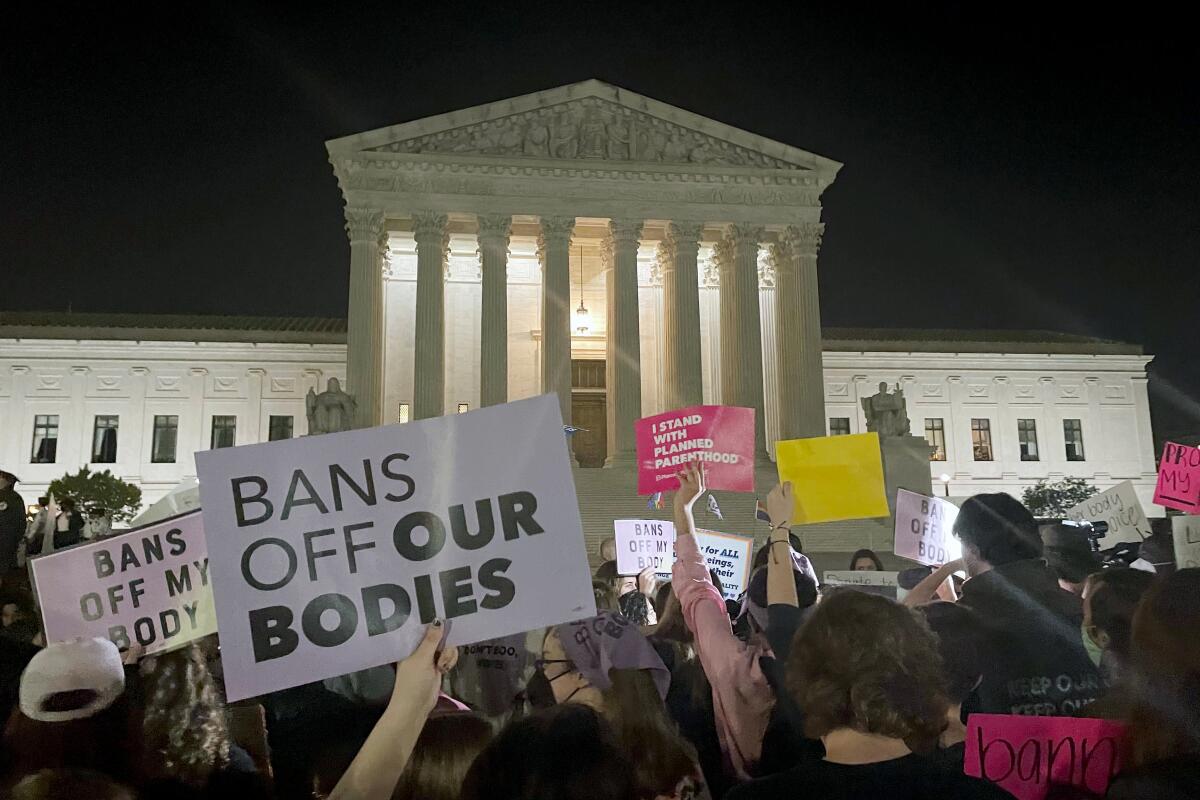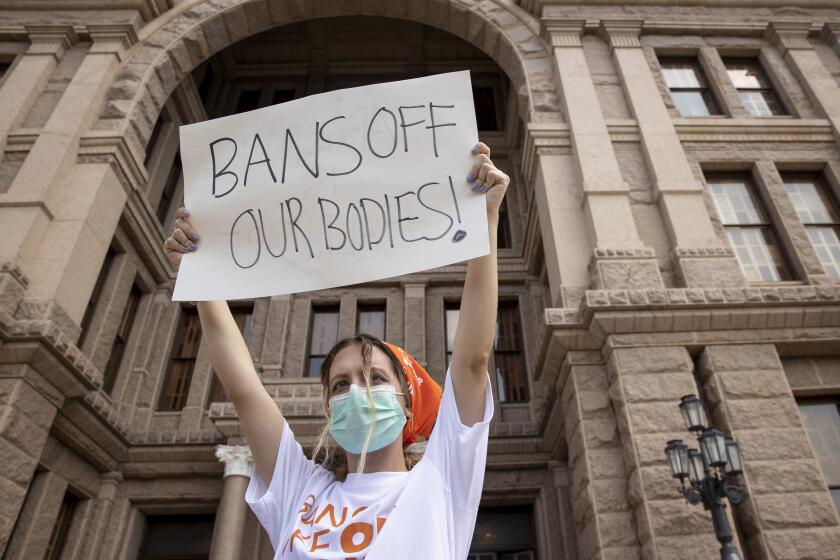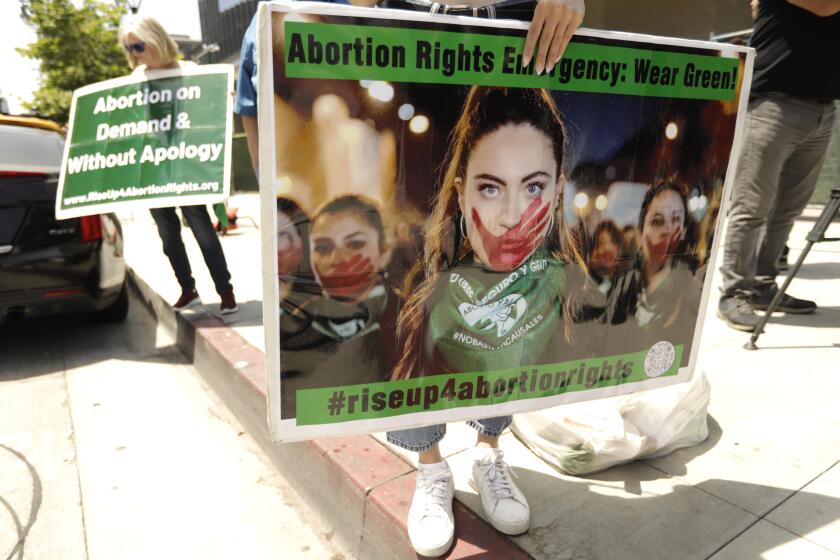Editorial: You think it’s bad now? Getting an abortion in a post-Roe world will be confusing and chaotic

- Share via
By the end of the month, we should know whether Roe vs. Wade is overturned outright by the Supreme Court — as the leak of a draft decision in May indicates — or eviscerated by the justices deciding to uphold the Mississippi state ban on abortion after 15 weeks of pregnancy.
More than likely, according to reproductive rights advocates, the court will overturn Roe in the Dobbs vs. Jackson Women’s Health Organization case, which involves the Mississippi ban. (Mississippi officials have asked the court to overturn Roe altogether.)
But which of these two courses the justices take hardly matters. Either way, practically speaking, the court will take away the constitutional right to an abortion and allow state legislatures to decide on whether to grant it. The court deciding to uphold the 15-week ban does away with the viability of the fetus (at about 24 weeks) as a central factor in a right to abortion. That move would allow antiabortion state legislators to adopt restrictions so early that a woman might not know she was pregnant. Already, 26 states are expected to either prohibit or severely restrict abortion. The other 24 states, including California, would continue to allow the procedure.
Putting the decision in the hands of state legislators won’t resolve the issue. Rather, it raises more questions, depending on how aggressively states want to pursue their antiabortion agenda. For example, will a state that outlaws abortion try to prevent its residents from getting an abortion out of state? The post-Roe world is likely to be confusing and legally chaotic for people seeking an abortion.
The Supreme Court is expected to overturn Roe vs. Wade. Our voting complacency let it happen. We have to stop being complacent now.
If Roe is overturned, it would trigger abortion prohibitions in 13 states — Missouri, Texas and Wyoming among them. These laws would go into effect shortly after Roe is overturned, and abortion providers in most of those states could be charged with a felony and ultimately fined, imprisoned or both. Another 13 states are expected to institute bans if Roe is overturned.
What is confusing and unknown is how those states would interpret and enforce their bans. Would some states seek to prosecute women for murder if they get an abortion? It seems frighteningly possible. The state of Louisiana introduced a bill this year that would have granted constitutional rights to fetuses and allowed abortion providers as well as women who have abortions to be charged with murder if Roe were overturned. After strong criticism from both advocates and opponents of abortion rights, the bill was withdrawn.
Generally, abortion opponents have shied away from criminalizing women who get an abortion. But if Roe is overturned, more bills similar to the Louisiana proposal may rise up in other states.
If you think that sounds preposterous, consider the trajectory of abortion restrictions adopted recently. Who foresaw Texas passing a law last year that unconstitutionally (under Roe) bans abortions after six weeks of pregnancy and assigns enforcement to bounty-hunting private citizens? It was a move so diabolical that even the majority of Supreme Court justices said they couldn’t figure out how to block it from going into effect.
A Missouri bill would deputize citizens to sue people who help a woman travel into another state to get an abortion. Talk about boundary crossing.
Another chilling tactic that may be used by states with abortion bans is making it illegal for people to help its residents get an abortion in another state where it’s legal. A state legislator in Missouri tried to get a law like that passed earlier this year. She wasn’t successful, but abortion rights advocates and legal scholars see this as a frontier that state legislators hostile to abortion will try to explore.
The California Legislature has taken that possibility seriously enough to introduce Assembly Bill 2091, which ensures that out-of-state subpoenas seeking information about a person who received abortion care in California are never granted.
There is also the concern that some states will try to stop abortion medication pills from being mailed to people in that state. The U.S. Food and Drug Administration allows pills to be dispensed by mail after a telehealth consultation with a provider. Some states have adopted unnecessary restrictions — such as requiring a number of in-person visits with a provider — and a handful of others ban medication abortion outright. More than half of abortions in the U.S. are done using a two-pill regimen. Will it be illegal for a healthcare provider in one state (or foreign country) where abortion is legal to ship pills to a person in a state where it’s illegal? Could a person pick up the pills in a state where it’s legal and then self-administer the pills (over the course of a couple of days) in the person’s home state where it’s illegal?
California lawmakers consider a dozen bills that will help prepare the state to be a haven for people seeking abortions.
How will overturning Roe affect the future of the dozens of nonprofit organizations that provide needy people with funds for abortion services, transportation and lodging? Could a state consider donors to such groups to be aiding someone who is getting an unlawful procedure and therefore outlaw people in the state from donating? What would happen to a company operating in a state that outlaws abortion but wants to offer their employees access to abortion care out of state? In Texas, 14 state legislators said they will introduce bills to prevent companies from doing just that.
Meanwhile, some abortion rights advocates wonder if the federal government could lease federal land to an abortion provider — if that land is located within a state that outlaws abortion. In an article in Politico last month, three law professors speculated that federal land operates under federal law, not state law, and that might be a workaround in a state that outlaws abortion. However, no one has tested this theory.
Overturning Roe won’t mark the end of abortion rights in the U.S., but it will certainly be the beginning of a tumultuous era, with half the states chipping away at reproductive rights within their borders and congressional Republicans possibly seeking a national abortion ban. There are hard times ahead, not just for pregnant people but for everyone who cares about the rights of Americans to control their own bodies.
More to Read
A cure for the common opinion
Get thought-provoking perspectives with our weekly newsletter.
You may occasionally receive promotional content from the Los Angeles Times.













